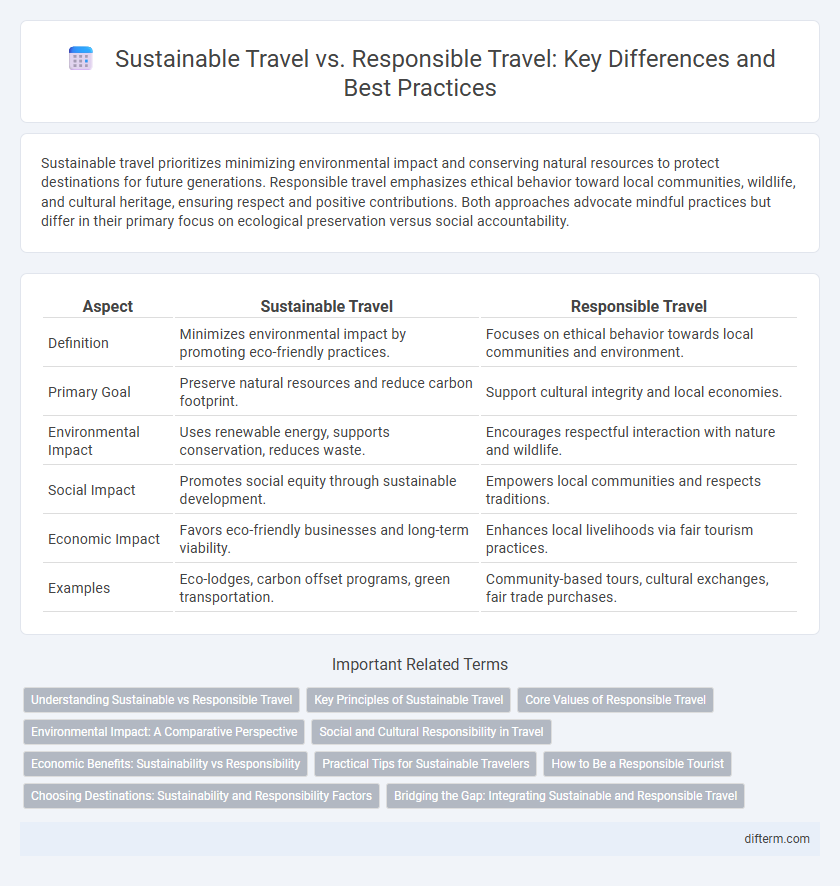Sustainable travel prioritizes minimizing environmental impact and conserving natural resources to protect destinations for future generations. Responsible travel emphasizes ethical behavior toward local communities, wildlife, and cultural heritage, ensuring respect and positive contributions. Both approaches advocate mindful practices but differ in their primary focus on ecological preservation versus social accountability.
Table of Comparison
| Aspect | Sustainable Travel | Responsible Travel |
|---|---|---|
| Definition | Minimizes environmental impact by promoting eco-friendly practices. | Focuses on ethical behavior towards local communities and environment. |
| Primary Goal | Preserve natural resources and reduce carbon footprint. | Support cultural integrity and local economies. |
| Environmental Impact | Uses renewable energy, supports conservation, reduces waste. | Encourages respectful interaction with nature and wildlife. |
| Social Impact | Promotes social equity through sustainable development. | Empowers local communities and respects traditions. |
| Economic Impact | Favors eco-friendly businesses and long-term viability. | Enhances local livelihoods via fair tourism practices. |
| Examples | Eco-lodges, carbon offset programs, green transportation. | Community-based tours, cultural exchanges, fair trade purchases. |
Understanding Sustainable vs Responsible Travel
Sustainable travel aims to minimize environmental impact by promoting eco-friendly practices such as reducing carbon emissions and supporting local conservation efforts. Responsible travel goes beyond environmental concerns, emphasizing ethical behavior, cultural sensitivity, and positive contributions to host communities. Understanding the distinction helps travelers make informed choices that protect natural resources while respecting social and cultural dynamics.
Key Principles of Sustainable Travel
Sustainable travel emphasizes minimizing environmental impact through practices such as reducing carbon emissions, conserving natural resources, and supporting biodiversity. Key principles include adopting eco-friendly transportation, choosing accommodations with green certifications, and participating in activities that promote local culture and economy without exploitation. Travelers prioritize long-term preservation of destinations, ensuring that tourism benefits both communities and ecosystems for future generations.
Core Values of Responsible Travel
Responsible travel emphasizes core values such as minimizing environmental impact, supporting local communities, and respecting cultural heritage, ensuring tourism benefits both hosts and visitors alike. It advocates for ethical choices, including using eco-friendly accommodations, engaging in fair trade activities, and promoting wildlife conservation. This approach fosters meaningful connections and long-term sustainability, distinguishing it from broader sustainable travel concepts.
Environmental Impact: A Comparative Perspective
Sustainable travel prioritizes minimizing environmental impact through long-term conservation efforts, such as reducing carbon emissions and promoting eco-friendly accommodations. Responsible travel emphasizes individual behavior changes, encouraging travelers to respect local ecosystems and cultural heritage during their visits. Both approaches aim to mitigate environmental degradation but differ in scale and implementation strategies.
Social and Cultural Responsibility in Travel
Sustainable travel emphasizes minimizing environmental impact while preserving cultural heritage and supporting local economies, ensuring that communities benefit long-term. Responsible travel highlights the importance of respecting social customs, promoting cultural exchange, and avoiding exploitation of indigenous populations. Both approaches advocate for traveler mindfulness toward local traditions and active contributions to community well-being.
Economic Benefits: Sustainability vs Responsibility
Sustainable travel promotes long-term economic benefits by supporting local economies through eco-friendly practices that reduce environmental impact and preserve cultural heritage. Responsible travel emphasizes immediate economic support for local communities by encouraging fair trade, ethical tourism, and respectful cultural exchanges. Both approaches foster economic resilience, but sustainability integrates future resource management while responsibility centers on ethical engagement and social equity.
Practical Tips for Sustainable Travelers
Sustainable travelers can reduce their environmental impact by choosing eco-friendly accommodations, using public transportation, and supporting local businesses that prioritize conservation. Responsible travel emphasizes respecting cultural heritage and wildlife, ensuring visitors minimize disruption to local communities. Simple practices like packing reusable items, avoiding single-use plastics, and participating in community-based tourism create meaningful, low-impact travel experiences.
How to Be a Responsible Tourist
Responsible tourists prioritize minimizing their environmental impact by choosing eco-friendly transportation, supporting local businesses, and respecting cultural heritage. They actively engage with local communities, ensuring their presence benefits rather than disrupts traditional ways of life. Practicing responsible tourism involves reducing waste, conserving water, and adhering to guidelines designed to protect natural habitats and wildlife.
Choosing Destinations: Sustainability and Responsibility Factors
Selecting travel destinations requires evaluating environmental impact, local community benefits, and cultural preservation. Sustainable travel prioritizes eco-friendly options such as protected natural sites and low-impact accommodations, while responsible travel emphasizes ethical interaction with locals and supporting fair-trade businesses. Balancing sustainability and responsibility ensures meaningful experiences that protect ecosystems and empower host communities.
Bridging the Gap: Integrating Sustainable and Responsible Travel
Bridging the gap between sustainable and responsible travel involves harmonizing environmental conservation with ethical cultural engagement to create meaningful, low-impact experiences. Sustainable travel prioritizes minimizing ecological footprints through energy-efficient accommodations and carbon offsetting, while responsible travel emphasizes respect for local communities and their traditions by supporting local economies and fostering authentic interactions. Integrating both approaches ensures travelers contribute positively to destinations by balancing ecological preservation with social and cultural responsibility.
sustainable travel vs responsible travel Infographic

 difterm.com
difterm.com